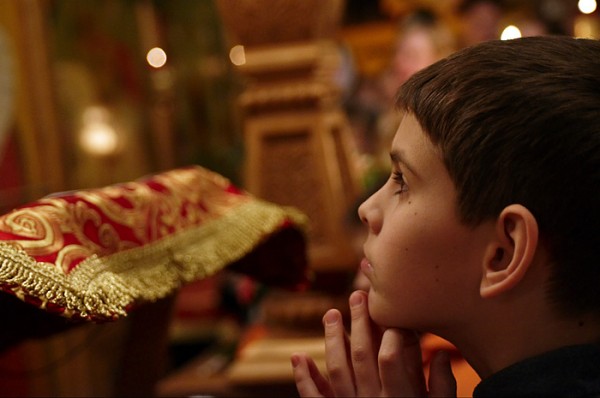Words said in jest often state our deepest feelings and our best thoughts. For years, whenever the opportunity presented itself, I would go to “God’s true church.” That’s what I told my wife fifteen years ago when I was among Orthodox Christians.
As a Lutheran pastor I taught, preached, and celebrated the truth of the Gospel. I was content for many years. I was not looking to “join another church,” I was merely paying attention to the movement of the Holy Spirit in my life. One day it dawned on me that I meant it when I said I was going to God’s true church.
Some reasons became clear in time. If you attend an Orthodox ekklesia, you hear theology sung week in, week out. You sense that you are bound into community where the whole is bigger than the sum of the parts. This community embraces the living and the dead in ways that are both visual and tangible, through icon and prayer and mystery. In this community the faith matters, it becomes material and does not remain cerebral. All the senses are used and called upon, so that you experience the faith rather than thinking about it. The pathway to Christian maturity is staked out for you. God the Holy Spirit is present in remarkable ways.
Strangers show interest in your spiritual journey. Angels appear. One day at Holy Trinity Cathedral in Chicago an old lady tugged on my sleeve and interrogated me with passion and urgency. “Do they know what this is all about? Do they know that this is about life in Christ, about receiving Christ into your life?” she asked about the students I brought that day. I said yes they did, and she said, “Well, do YOU know?”
Because of the unique circumstances of my ministry, I had an opportunity to learn about faith communities during eleven years in university ministry and fourteen years teaching at the Lutheran School of Theology at Chicago. For ten years I had no Sunday responsibilities. Often I would shepherd students to worship in other faith traditions. People initially strangers, to whom I am gratefully indebted, became key guides for a mini-course on Orthodoxy I sponsored for eight years. I had a quarter century in which to make different explorations, of which Orthodoxy became chief.
Most people never have the opportunity I had, or they do not take it because they suspect that churches, like people, are “basically the same everywhere,” when in fact that is true neither for churches nor for people. Most people live and die inside one tradition, if at all, no matter how well or poorly understood. We are told, in America, that religion is a private matter. This idea marginalizes and trivializes any search we might make. By the same token, we do not think that we can move beyond “religion” into a full way of liberation in any of the options offered by churches. I am convinced many folks take refuge in Buddhism because it teaches something “beyond religion” which we might learn in our own traditions, but cannot because our culture blinds us to such a search. I had a unique opportunity for which I am grateful.
As I looked around, I found Anglicanism to be attractive but I was put off by the extremes. The Anglican principle of breadth allows all positions from orthodoxy to heterodoxy to heresy. It’s allee allee in free. My Episcopal friends have said that you have to go on a church by church basis to find the right congregation. Things fall apart. We may not even see the center at times when the circumference is so crowded with different interpretations, and competing ones at that.
Rome holds a warm place in my heart. After all, the ecumenical destiny of the west is with Rome, despite what people committed to ecclesial structures may think. But could there be an even larger ecumenical destiny? Rome recognized this at the second Vatican Council, which emphasized the “collegiality” of the (western) bishops. Papal infallibility has to be seen in relation to collegiality, not as a separate view about the proclamatory power of an individual bishop. Bishop Kallistos Ware, among others, has said that new Councils might define new ways to understand the faith, but they must be genuinely ecumenical. East and west must embrace as equals.
By the time I moved from Chicago, I had been with Quakers. I had been with Anabaptists, both in the Church of the Brethren and in the Bruderhof. I had been with Catholics and many protestants. I had been with Episcopalians. I had been with Buddhists. I had been with Muslims. I knew the relationships possible between Jews and Christians. I had served on numerous ecumenical committees and commissions.
Rome added pronouncements of dogma in ways I find neither biblical nor helpful. At the same time, protestant ecclesial establishments seemed incomplete to me. Neither option is “God’s true church,” at least not in its fullness. Something is always missing: a conviction, a path to walk, the sacraments. Conversely, claims of wholeness are made for that which is partial: a form of church government, an infallible Bible, a peculiar interpretation of scripture, or one teaching out of the whole range of doctrines. So I knew that I had to step over the Rome/Protestant split.
The saying has been attributed to Jaroslav Pelikan, the church historian: you only know what a Lutheran is by asking what he would be if he were not Lutheran.
The statement says volumes in few words. It says that the reformation project is incomplete. Forty years ago I learned to call Lutheranism “a confessing movement in western Christianity.” “Movement” says you are on the way to an end you see but do not yet possess. “Movement” suggests that this is not yet fully church or ekklesia.
Before I left Chicago I knew what I would be if I were not Lutheran. I would be Orthodox. I began where I was, and the path opened out from there. I hasten to say that the whole point of walking this path was and is to follow Jesus as Christ and Lord. That is what this search is all about. In the end it’s really not about me. It is the desire to become fully and deeply “in Christ” as the Paul of the Philippian letter. As St Augustine said, “our hearts are restless until they find their rest in Thee.”
I sought the fullness of the ekklesia. My experience of Christian community was good insofar as it went, but was not fully that of a church where God offers us a marked pathway to holiness. I was looking for both ortho-doxia, “right praise,” and ortho-praxis, “right action.”
God became human in Jesus of Nazareth and sent the Spirit to gather us into the Body of Christ on earth. “God became man in order that man might become God” said St Athanasius. We become by grace and forgiveness what God is by nature. This is the rock bottom faith of the church and the sine qua non of Christian existence. Certain things follow automatically. First, a solid and tangible community embodies this truth. You cannot be Christian alone. Solo is dodo. We grow in community with others or not at all.
Second, in this community we receive the truth through the proclaimed Word. We cannot say this word to ourselves. We do not invent it. This word comes to us as address; only thus is it powerful. This spoken word comes to us in written form as well; furthermore, we cannot deny that it comes to us in a wrapper of interpretive tradition which stretches back to the period of the Apostolic writers. But the audible Word is not all there is.
Third, we touch and taste and see the visible word: “Oh taste and see that the Lord is Good,” says the Psalmist, and this comes alive for Christians through what we call the sacraments. But even to call them “sacraments,” as Leo the Great knew many centuries ago, limits their truth within a framework of meaning or description. In his lenten catechetical sermons Leo made clear that many things could be sacraments precisely because God had entered the material world in the form of a human being. Once you see that this is the heart of the faith, you yearn for the sacramental life. You run to the Sacraments, as Luther said. Through them God comes running to you.
My limited definitions of God are inadequate. I understand why the Romans called early Christians atheists; they refused to believe in the “gods.” I am not looking for a church that agrees with my limited and self-interested sense of what Christianity or God should be. I seek a church which teaches the faith as it has been held in fullness through the centuries as best we can determine from scripture and tradition. Only here will I find what is good for my soul, not a way, however cleverly masked, by which to lift myself by my own bootstraps. Consumer mentality does not serve us here. When it comes to what’s good for the soul we don’t know. We pander to our own proclivities, give in to our own sentiments, and in general make up religion as we go along. I didn’t want that.
I love the take-it-or-leave-it Orthodox style: This is the faith. We welcome you into it; just don’t ask us to change it for you. You get no comfortable or easy faith that conforms to your desires. You bump into a body of teaching from Bible and Tradition you are called to stand under and to humble yourself before, in order to understand. You are called to a life that makes demands and promises one simple gift: the Presence of God from now to eternity. Orthodox bishops may fight among themselves, but you know that they will close ranks if the faith is threatened. They will because they know that the faith can only bring us to holiness when it is maintained in catholic wholeness. All the parts interlock with one another to form a whole pathway.
So I come at last to Orthodoxy where the fullness of faith is maintained in order that we might live it. Only by doing so can we learn the meaning of words like “salvation” and “grace” and “life” in our bodies and not with our minds alone. Here is a complete, open pathway which feels ironically like the place where you finally come to rest, in Augustine’s sense.
The Jesus prayer accompanied me on the pathway. Through this prayer I have been led to greater intellectual clarity in the faith, deeper spirituality, desire for fuller community, and an earnest desire to witness the faith in actions and words. This too was part of the silent leading that brought me thus far in the faith.
If there is no resurrection, our faith is in vain (I Cor. 15). That word “vain” means empty, nothing inside, no reason to give a moment’s thought. Without the message, the faith, and the truth of Christ’s Resurrection why bother to darken the door of a church? We do not come for the camaraderie we find at social gatherings. We come to be made One in Christ. We come to know the truth which can set us free.
Peter Rosi, M.D., told me that he came to faith when he saw the Coptic martyrs. No easy Christianity, this! People laying down their lives and not metaphorically. One has to admire this, and Orthodoxy has borne more than its share of suffering among the world’s Christian churches. Yet it survived in many lands despite persecutions, some more severe than we shall ever know, because the faithful knew the freedom of the truth and would not give it up. Here is resurrection faith.
I would praise any attempt to create Christian community. If you pay attention, however, if you seek the fullness of the Christian life I believe the pathway leads to Orthodoxy. I never set out to become an Orthodox Christian. I read Orthodox theology to open new doors of understanding and, more important, Orthodox spirituality opened the world of the ascetic life. I resisted the invitation to become a chrismated member for over two decades. It took years to make real my own inner conviction that Orthodoxy is the true form of Christianity. It was a long path but my wife Susan said near that end which is a beginning, my chrismation, that it was all “inevitable.” She saw more clearly than I the pathway on which I was walking.
Christianity has centripetal force. If you begin anywhere on the rim of the circle, and you are in it for the long haul, the Spirit will pull you into the center. Nothing is lost on the way and eventually you come to the center where everything that matters remains. In a way I cannot fully express, and have just begun to understand, in order to remain Lutheran I had to become Orthodox.
I found it exceedingly hard to change precisely because I understood the faith, and that is the protestant problem: to substitute mental comprehension (if we may call it that) for bodily participation, thought for action, mind for body. It’s built into the system: protestantism is a faith grounded in the Word, and thank God for that. It simply does not go far enough.
But more: I found it exceedingly hard to change because so much of the faith appears the same. Lutherans have scripture and sacraments. Lutherans have the prayers of the ages and the liturgical hymnody of the Bible and early church: te deum, nunc dimittis, magnificat, benedictus – all that. Many churches have returned to weekly eucharist, and some to child communion. Lutherans teach that the bread and the wine of the sacrament are mysteriously the body and blood of the risen Christ. Lutherans hold the historic creeds (albeit with the disputed filioque in the Nicene Creed) and accept the decisions of the first seven ecumenical councils, though many Lutherans do not know this since pastors may not teach it after learning it themselves in seminary. Lutherans have the full western liturgy – and the fight to keep it from degenerating into sentimentality or entertainment. Lutherans use vestments, candles, and paraments. The church year is almost the same as in Orthodoxy; pascha is central.
The Lutheran church in America also possesses extraordinary breadth, from evangelicalism to catholicity and every stop in between. In part this breadth is because the church has always viewed most of the things that make up bodily participation in the faith as adiaphora, which means unnecessary stuff. This is perceived by many as a strength, but I came to see it as a weakness. It is more than a weakness when one gets the feeling that the Trinity is dispensible, or we can argue about the two natures of Christ as if the teaching were up for grabs. In truth, peripheral matters began to crowd out the center of the faith, from my perspective.
I was always an evangelical catholic, but this is a “special interest group” in Lutheranism, and by no means the majority position. Study and spiritual discipline oriented me to Christ-mysticism by way of the Jesus-prayer and the use of icons and the desire for confession. So membership in Orthodoxy did not feel like a giant leap for me, given my expanded understanding of Lutheranism. It did feel like a leap to leave the church which had nurtured me for all my life until the last, say, ten years. I don’t know how much of a leap it would be for others since they run the gamut from evangelical protestant to evangelical catholic. Everyone’s journey is unique anyway.
Orthodoxy retarded its own growth in America by remaining in ethnic enclaves. Only in the last quarter century has the inner grace of the faith become available to Americans who are not from Greek or Russian or Syrian backgrounds. The language barrier and the insularity of the people hid the truth and fullness of the faith even if the outer beauty was visible. Only in the last fifteen years have books appeared that popularize the faith so it is accessible to readers untrained in theology. And thank God for the Orthodox Study Bible: New Testament. People born into Orthodoxy must work to appreciate it. They have their own journey to claim the depth of the faith. Their journey will be different from those of us converts. As we enter the 21st Century, however, Orthodoxy has the opportunity to blossom in post-modern America.
I know this: once you make the leap, however small it may seem at first, you are in a new world and there is always much to learn. The magnetism of the Orthodox Church finally drew me into full participation when the time was right. And my heart is full of joy because “Christ is in our midst.”

















